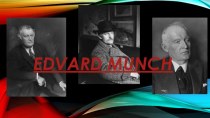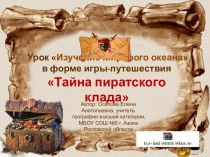- Главная
- Разное
- Бизнес и предпринимательство
- Образование
- Развлечения
- Государство
- Спорт
- Графика
- Культурология
- Еда и кулинария
- Лингвистика
- Религиоведение
- Черчение
- Физкультура
- ИЗО
- Психология
- Социология
- Английский язык
- Астрономия
- Алгебра
- Биология
- География
- Геометрия
- Детские презентации
- Информатика
- История
- Литература
- Маркетинг
- Математика
- Медицина
- Менеджмент
- Музыка
- МХК
- Немецкий язык
- ОБЖ
- Обществознание
- Окружающий мир
- Педагогика
- Русский язык
- Технология
- Физика
- Философия
- Химия
- Шаблоны, картинки для презентаций
- Экология
- Экономика
- Юриспруденция
Что такое findslide.org?
FindSlide.org - это сайт презентаций, докладов, шаблонов в формате PowerPoint.
Обратная связь
Email: Нажмите что бы посмотреть
Презентация на тему по английскому языку на тему Лос Анджелес (5 класс)
Содержание
- 2. WALK OF FAMEThe walk of Fame stretches
- 3. WALK OF FAMEС
- 4. Ennis HouseCosts escalated owing to difficulties developed
- 5. Ennis House
- 6. Hollywood BowlThe amphitheatre is located at the
- 7. Hollywood Bowl
- 8. Eco-ParkYear after year, the Park is shrinking.
- 9. Eco-Park
- 10. Watts TowersRodia spent 33 years building the
- 11. Watts Towers
- 12. Скачать презентацию
- 13. Похожие презентации
WALK OF FAMEThe walk of Fame stretches from East to West along Hollywood Boulevard from Gower street to La Brea Avenue, and quite a bit Along the way Marshfield, which is located diagonally between Hollywood Boulevard
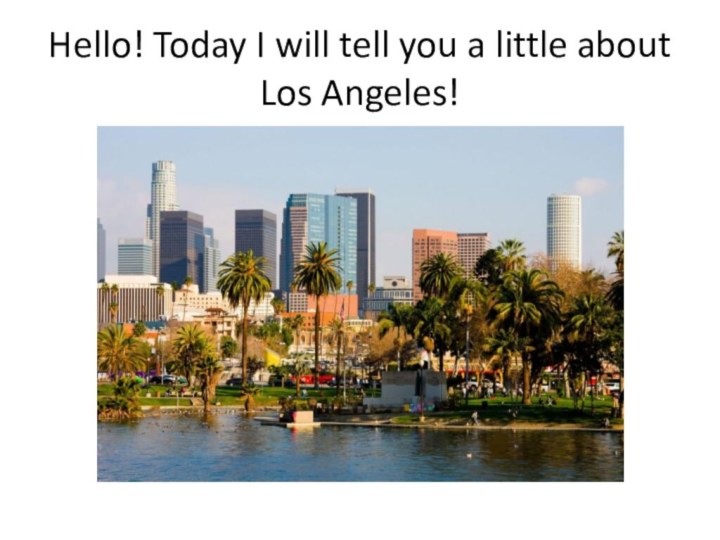
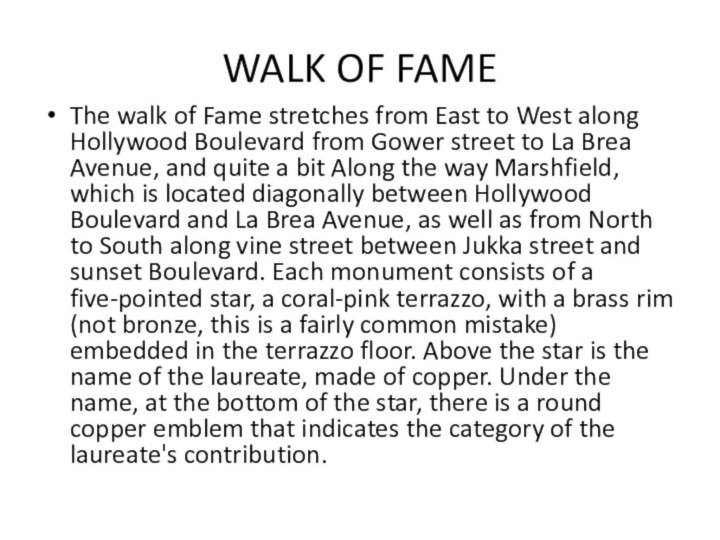
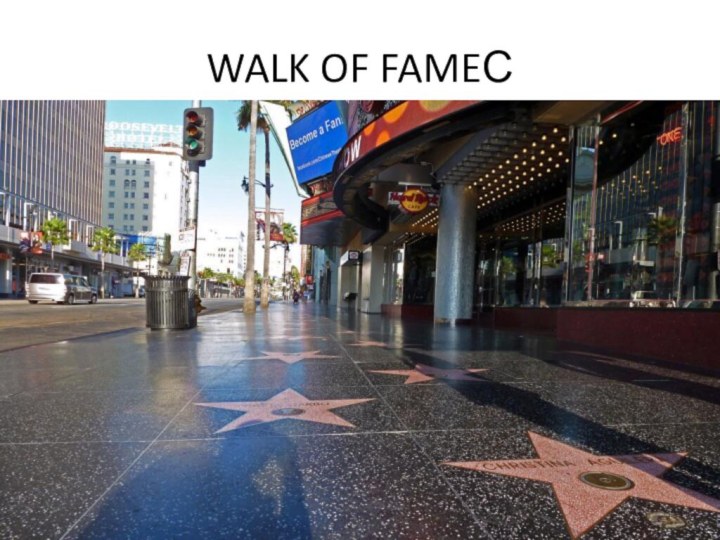
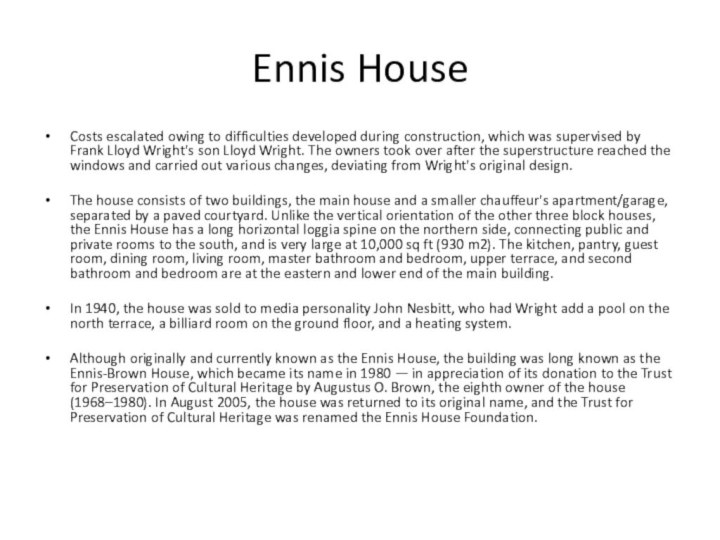
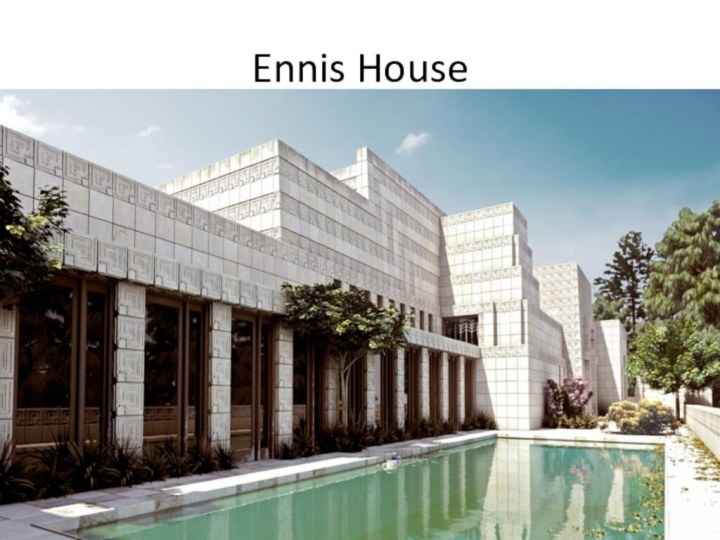
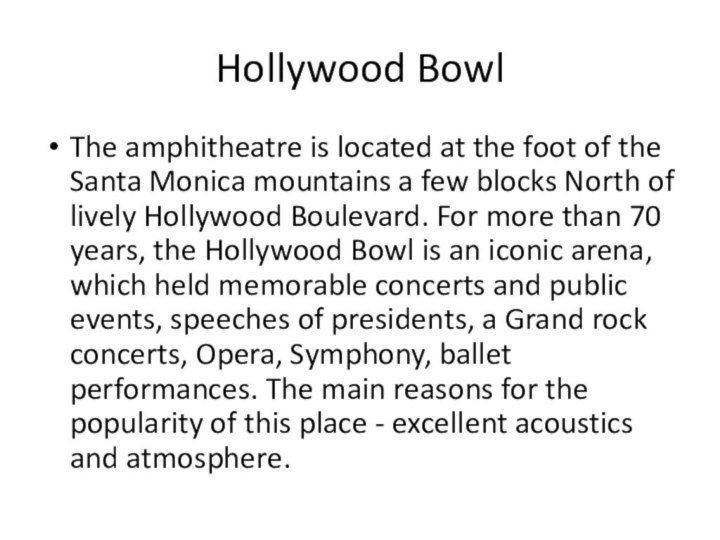
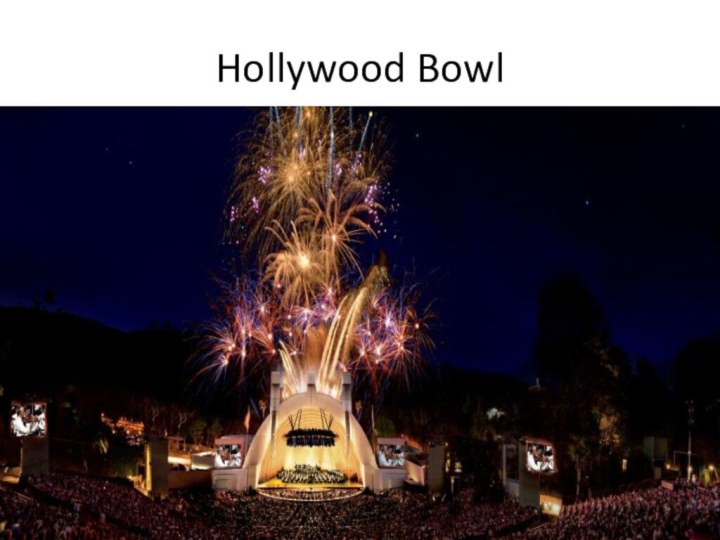
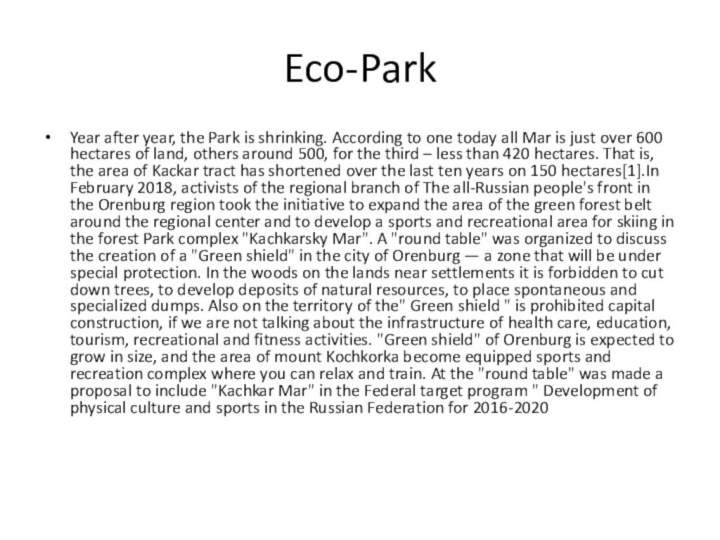
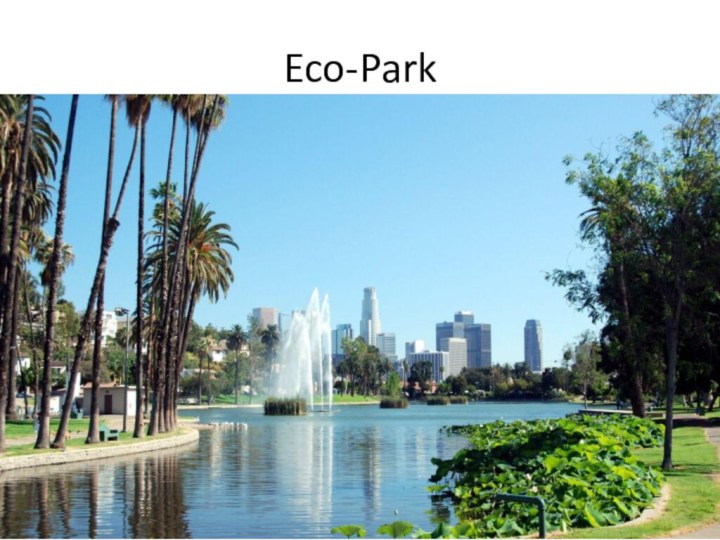

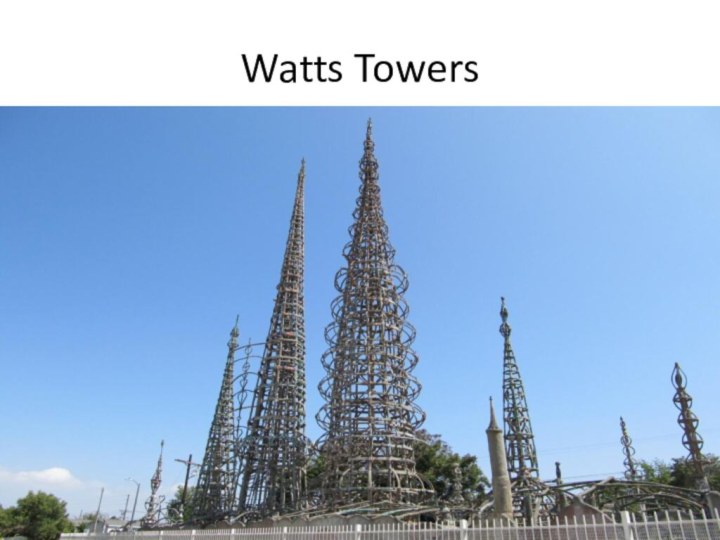

Слайд 4
Ennis House
Costs escalated owing to difficulties developed during
construction, which was supervised by Frank Lloyd Wright's son
Lloyd Wright. The owners took over after the superstructure reached the windows and carried out various changes, deviating from Wright's original design.The house consists of two buildings, the main house and a smaller chauffeur's apartment/garage, separated by a paved courtyard. Unlike the vertical orientation of the other three block houses, the Ennis House has a long horizontal loggia spine on the northern side, connecting public and private rooms to the south, and is very large at 10,000 sq ft (930 m2). The kitchen, pantry, guest room, dining room, living room, master bathroom and bedroom, upper terrace, and second bathroom and bedroom are at the eastern and lower end of the main building.
In 1940, the house was sold to media personality John Nesbitt, who had Wright add a pool on the north terrace, a billiard room on the ground floor, and a heating system.
Although originally and currently known as the Ennis House, the building was long known as the Ennis-Brown House, which became its name in 1980 — in appreciation of its donation to the Trust for Preservation of Cultural Heritage by Augustus O. Brown, the eighth owner of the house (1968–1980). In August 2005, the house was returned to its original name, and the Trust for Preservation of Cultural Heritage was renamed the Ennis House Foundation.
Слайд 6
Hollywood Bowl
The amphitheatre is located at the foot
of the Santa Monica mountains a few blocks North
of lively Hollywood Boulevard. For more than 70 years, the Hollywood Bowl is an iconic arena, which held memorable concerts and public events, speeches of presidents, a Grand rock concerts, Opera, Symphony, ballet performances. The main reasons for the popularity of this place - excellent acoustics and atmosphere.
Слайд 8
Eco-Park
Year after year, the Park is shrinking. According
to one today all Mar is just over 600
hectares of land, others around 500, for the third – less than 420 hectares. That is, the area of Kackar tract has shortened over the last ten years on 150 hectares[1].In February 2018, activists of the regional branch of The all-Russian people's front in the Orenburg region took the initiative to expand the area of the green forest belt around the regional center and to develop a sports and recreational area for skiing in the forest Park complex "Kachkarsky Mar". A "round table" was organized to discuss the creation of a "Green shield" in the city of Orenburg — a zone that will be under special protection. In the woods on the lands near settlements it is forbidden to cut down trees, to develop deposits of natural resources, to place spontaneous and specialized dumps. Also on the territory of the" Green shield " is prohibited capital construction, if we are not talking about the infrastructure of health care, education, tourism, recreational and fitness activities. "Green shield" of Orenburg is expected to grow in size, and the area of mount Kochkorka become equipped sports and recreation complex where you can relax and train. At the "round table" was made a proposal to include "Kachkar Mar" in the Federal target program " Development of physical culture and sports in the Russian Federation for 2016-2020
Слайд 10
Watts Towers
Rodia spent 33 years building the towers
on a small piece of land he had purchased
shortly after moving to Watts in 1917. Before moving to the L.A. suburb, he had lived in Seattle and the San Francisco Bay Area, doing odd jobs. Divorced, estranged from his children, he came to Watts with little money or future. "I was one of the bad men in the United States," he recalled. "I was drunk all the time, always drinking."[6]He was forty-two, barely literate, unskilled beyond the basic tasks from a life of labor. To this day no one is sure why, but in 1921 he began to build "something big." "You have to be either good good or bad bad to be remembered," he often said. "You gotta do somethin' they never got 'em in the world."[7] He began by digging a foundation, then made the rest up as he went along.
The sculptures' armatures are constructed from steel rebar and Rodia's own concoction of a type of concrete, wrapped with wire mesh. The main supports are embedded with pieces of porcelain, tile, and glass. They are decorated with found objects, including bottles, ceramic tiles, seashells, figurines, mirrors, and much more. Rodia called the Towers "Nuestro Pueblo" ("our town" in Spanish). He built them with no special equipment or predetermined design, working alone with hand tools. Neighborhood children brought pieces of broken pottery to Rodia, and he also used damaged pieces from the Malibu Pottery and CALCO (California Clay Products Company). Green glass includes recognizable soft drink bottles from the 1930s through 1950s, some still bearing the former logos of 7 Up, Squirt, Bubble Up, and Canada Dry; blue glass appears to be from milk of magnesia bottles.
Rodia bent much of the Towers' framework from scrap rebar, using nearby railroad tracks as a makeshift vise. Other items came from alongside the Pacific Electric Railway right-of-way between Watts and Wilmington. Rodia often walked the right-of-way all the way to Wilmington in search of material, a distance of nearly 20 miles (32 km).









